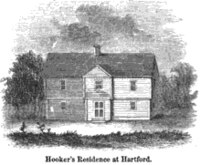thomas hooker

July 5, 1586 – July 7, 1647
burth
Most likely coming out of the county of Leicestershire, in the East Midlands region, the Hooker family was prominent at least as far back as the reign of Henry VIII. There is known to have been a great Hooker family in Devon, well known throughout Southern England. The Devon branch produced the great theologian and clergyman, the Rev. Richard Hooker who, with Sir Walter Raleigh, was one of the two most influential sons of Exeter, the county town of Devon. Family genealogist Edward Hooker linked the Rev. Thomas to the Rev. Richard and the Devon branch. Other Hooker genealogists, however, have traced the Rev. Thomas back to Leicestershire where, in fact, he is said to have been born. Positive evidence linking Thomas to Leicestershire is lacking since the Maresfield parish records from before 1610 perished. Any link to the Rev. Richard is likewise lacking since the Rev. Thomas’s personal papers were disposed of and his house destroyed after his death. There remains no evidence giving positive information as to which region Hooker came from, so the issue remains unsettled.
This led to the founding of the Connecticut Colony.[5][16] Hooker became more active in politics in Connecticut. The General Court representing Wethersfield, Windsor and Hartford met at the end of May 1638 to frame a written constitution in order to establish a government for the commonwealth. Hooker preached the opening sermon at First Church of Hartford on May 31, declaring that "the foundation of authority is laid in the free consent of the people.
On January 14, 1639, freemen from these three settlements ratified the "Fundamental Orders of Connecticut" in what John Fiske called "the first written constitution known to history that created a government. It marked the beginnings of American democracy, of which Thomas Hooker deserves more than any other man to be called the father. The government of the United States today is in lineal descent more nearly related to that of Connecticut than to that of any of the other thirteen colonies."
John Hooker, son of Rev. Samuel and grandson of Rev. Thomas, served as Speaker of the Connecticut Assembly, and previously as Judge of the state supreme court. James Hooker, brother of John and son of Rev. Samuel, also became a prominent political figure in Connecticut. He married the daughter of William Leete of Guilford, Connecticut, and subsequently settled there. James Hooker served as the first probate judge, and later as speaker of the Connecticut colonial assembly. Rev. Thomas's granddaughter Mary Hooker, the daughter of Rev. Samuel, married the Rev. James Pierpont. Their daughter Sarah Pierpont married the Rev. Jonathan Edwards.
Thomas Hooker came to the colonies with his second wife, Suzanne. Nothing is known of his first wife.
His daughter Mary married Rev. Roger Newton who was a founder and first minister of Farmington, Connecticut. He later went on to be minister in Milford, Connecticut.

Called today “the Father of conneticut
later
DETH
July 7, 1647, Hartford, CT
Around 1626, Hooker became a lecturer or preacher at what was then St. Mary's parish church, Chelmsford (now the Chelmsford Cathedral) and curate to its rector, John Michaelson.[5] However, in 1629 Archbishop William Laud suppressed church lecturers, and Hooker was forced to retire to Little Baddow.[5] His leadership of Puritan sympathizers brought him a summons to the Court of High Commission. Forfeiting his bond, Hooker fled to Rotterdam (the Netherlands,[8] and for a time considered a position in the English reformed church in Amsterdam, as assistant to its senior paster, the Rev. John Paget.[10] From Holland, after a final clandestine trip to England to put his affairs in order,[11] he immigrated to the Massachusetts Bay Colony aboard the Griffin.[1][5]
Hooker arrived in Boston and settled in Newtown (later renamed Cambridge), where he became the pastor of the earliest established church there, known to its members as "The Church of Christ at Cambridge." [12] His congregation, some of whom may have been members of congregations he had served in England,[13] became known as "Mr. Hooker's Company".[5]

